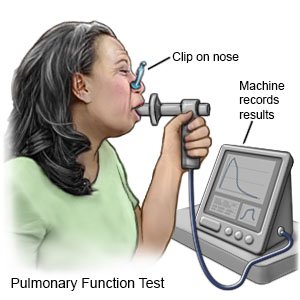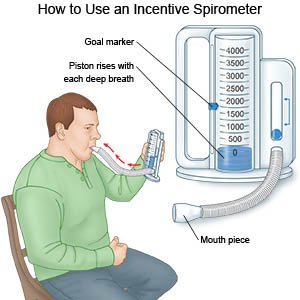Pneumonitis
Medically reviewed by Drugs.com. Last updated on Aug 4, 2025.
What is pneumonitis?
Pneumonitis is inflammation of your lungs. The inflammation can make it hard to breathe and prevent you from getting enough oxygen. Anything that irritates your lung tissues can lead to pneumonitis. The longer you are exposed, the more damage your lungs will develop. Pneumonitis can last a short time or become chronic.
 |
What causes or increases my risk for pneumonitis?
- Radiation for cancer treatment
- Mold, a virus, or bacteria
- Chemicals such as pesticides, pool chemicals, or household cleaners
- Certain medicines, such as antibiotics, cancer medicines, and some heart medicines
- Smoke from a fire, or dust from grains, such as on a farm
- Food or liquid that you inhale
- Exposure to bird feathers or droppings
What are the signs and symptoms of pneumonitis?
- A cough or trouble breathing
- A wheeze or chirp as you breathe in
- Runny nose, watery eyes, or a sore throat
- Pain, tightness, or burning in your throat or chest
- Sudden headache, dizziness, trouble thinking clearly, or feeling faint
- Blue lips or fingernails
- Fever, chills, and muscle aches
- Colds or lung infections that happen often
- Weight loss
How is pneumonitis diagnosed?
Your healthcare provider will ask about your symptoms and when they began. He or she will ask if you know what you were exposed to. You may also need any of the following tests:
- Blood tests are used to check the amounts of oxygen and carbon dioxide in your blood. The results can tell healthcare providers how well your lungs are working. Blood tests may also be used to check for signs of an allergic reaction. Your body may be creating inflammation as a response to something you are allergic to.
- X-rays or CT scans may be used to check for an infection or fluid in your lungs. The pictures may also show fibrosis (scarring of your lung tissues).
- Pulmonary function tests (PFTs) will show how much oxygen your body is getting. You breathe into a mouthpiece connected to a machine. The machine measures how much air you breathe in and out over a certain amount of time.

- A bronchoscopy is a procedure to look inside your airway. A bronchoscope (thin tube with a light) is inserted into your mouth and moved down your throat to your airway.
- A sample of lung tissue may be sent to a lab for tests. The sample may be taken during a bronchoscopy, through surgery, or frozen and removed through a procedure called cryobiopsy.
How is pneumonitis treated?
Your symptoms may go away without treatment. If your symptoms are severe or do not go away, you may need any of the following:
- Medicines decrease coughing and inflammation, open airways, and make it easier for you to breathe. You may also need medicine to treat a bacterial infection.
- Oxygen may be given if the level of oxygen in your blood gets too low.
What can I do to manage pneumonitis?
- Rest as directed. Keep the head of your bed raised to help you breathe easier. You can also raise your head and shoulders up on pillows or rest in a reclining chair.
- Do deep breathing and coughing. Deep breaths help open your airway and clear mucus or congestion. Take a deep breath and hold it for as long as you can. Let the air out and then cough strongly. You may be given an incentive spirometer to help you take deep breaths. Put the plastic piece in your mouth. Take a slow, deep breath. Then let the air out and cough. Repeat these steps as directed by your healthcare provider.

- Do not smoke. Avoid secondhand smoke. Nicotine and other chemicals in cigarettes and cigars can make it harder for your lung inflammation to get better. Ask your healthcare provider for information if you currently smoke and need help to quit. E-cigarettes or smokeless tobacco still contain nicotine. Talk to your healthcare provider before you use these products.
- Get the flu vaccine. The flu can become serious in anyone who has a lung condition. Get the flu vaccine as soon as recommended each year, usually in September or October. You may also need the pneumococcal vaccine to prevent pneumonia.
- Do not drink alcohol when you are sick. Alcohol dulls your urge to cough and sneeze. Alcohol also causes your body to lose fluid. This can make the mucus in your lungs thicker and harder to cough up.
- Drink more liquids. Liquids help keep your air passages moist and better able to get rid of germs and other irritants. Ask your healthcare provider how much liquid to drink each day and which liquids are best for you.
- Use a cool mist humidifier. A humidifier will help increase air moisture in your home. This may make it easier for you to breathe and help decrease your cough.
- Go to pulmonary rehabilitation (rehab) as directed. Your healthcare provider may recommend rehab if you develop chronic pneumonitis. A rehab therapist can teach you breathing exercises to help keep your airway open.
What can I do to prevent pneumonitis?
- Avoid anything that irritates your lungs. Examples include smoke, dust, and fumes. You may need to wear a mask if you work with something that irritates your lungs.
- Be careful with household cleaners. Do not combine products that contain bleach and chlorine. Do not use these chemicals in closed spaces. Open a window or door to keep the air flowing.
When should I seek immediate care?
- You have trouble breathing.
- You faint or cannot think clearly.
- You cough up blood.
- Your lips or fingernails turn blue or gray.
- Your lips, tongue, or throat swell and you have trouble breathing or swallowing.
When should I call my doctor?
- You have a fever that lasts more than 3 days, even with treatment.
- Your chest pain or breathing problems do not go away or get worse.
- Your cough does not get better with treatment.
- You vomit or have diarrhea.
- You have questions or concerns about your condition or care.
Care Agreement
You have the right to help plan your care. Learn about your health condition and how it may be treated. Discuss treatment options with your healthcare providers to decide what care you want to receive. You always have the right to refuse treatment. The above information is an educational aid only. It is not intended as medical advice for individual conditions or treatments. Talk to your doctor, nurse or pharmacist before following any medical regimen to see if it is safe and effective for you.© Copyright Merative 2025 Information is for End User's use only and may not be sold, redistributed or otherwise used for commercial purposes.
Learn more about Pneumonitis
Treatment options
Care guides
Further information
Always consult your healthcare provider to ensure the information displayed on this page applies to your personal circumstances.
